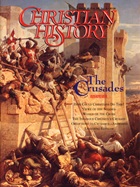Christians marching off to holy war—how can we understand that? And did any good come of it? To answer these questions, Christian History editors Kevin Miller and Mark Galli talked with Jonathan Riley-Smith, professor of history at Royal Holloway and Bedford New College, University of London. Professor Riley-Smith is author of The Crusades: A Short History (Yale, 1987) and numerous other books on the crusading era.
Christian History: In the first three centuries, Christians were pacifists. By 1096, they embarked on a holy war. What caused such a huge change?
Jonathan Riley-Smith: First, the early church was not entirely pacifist. In Romans 13, for example, Paul justifies the violence of the pagan emperor, for the emperor is yet a minister of God. And Christians served in the Roman army from the second century on.
Following the conversion of the emperors, in the fourth century, the church became more open to using violence. Church leaders, after an initial shock, began supporting the use of force against heretics.
Then Augustine formulated his theory of “just war,” but his terms effectively mean “holy war.” Augustine and the medieval world concluded that violence is not evil. Instead, violence is morally neutral. That makes a crusade possible.
How did medieval Christians support their idea that violence was morally neutral?
Augustine gave this example: Suppose a man has gangrene in the leg and is going to die. The surgeon believes the only way to save him is by amputating the leg. Against the man’s will, the surgeon straps him to a table and saws off the leg. That is an act of extreme violence.
But was that violence evil? Augustine said no. And if you find one exception to the idea that violence is evil, he concluded, then violence cannot be intrinsically evil.
Thus, for medieval theologians, violence may or may not be evil; it depends largely on the intention of the perpetrator. Until the sixteenth and seventeenth centuries, this was the normative Christian view. In fact, the majority of Christians over 2,000 years have believed that violence may be justified under certain circumstances.
It’s one thing to say violence is morally neutral, but how did the crusaders justify an offensive strike against Islam?
If you had asked a canon lawyer (theologian), he would have said the crusades were defensive: Christians were defending their brothers and sisters in the East from Muslim aggression and oppression, or they were regaining land that had been taken by Muslims. Senior churchmen maintained that when Christianity goes to war, it can only be in defense or for the recovery of property.
But if you had mingled with a crowd of knights in the late eleventh century, they would have said they were fighting for “the liberation of Jerusalem”. That’s not so hard to understand when you consider that Christians reach the same conclusions today.
Christians crusade today?
Think about the more militant advocates of Christian liberation. Although liberationists argue for rebellion rather than war, they put forward arguments that were made in the twelfth and thirteenth centuries: Violence is morally neutral; Christ intends people to live in just political structures; Christ is present in the process of liberation; we must show solidarity with our oppressed brothers and sisters; dying in this cause is martyrdom.
Every Christian reformation is accompanied by violence.
—Jonathan Riley-Smith
It’s often said that Christians were more cruel than the Muslims—for example, when they captured a city. Do you think that’s true?
I don’t think it is. The case that is always given is this: When the Christians took Jerusalem in 1099, they mercilessly sacked the city, killing nearly everyone; but when the Muslims under Saladin captured Jerusalem in 1187, they allowed captives to go free.
But that example accords with the medieval laws of war: if a city surrenders, you don’t sack it; if it resists, you do. Jerusalem resisted in 1099, and it was sacked. When it surrendered in 1187, it was not. In actuality, you find cruelty on both sides.
We must also be aware of combat psychology. Long campaigns, as many of the crusades were, put tremendous stress on combatants. Today we recognize that under the stress of battle and fatigue, discipline can disintegrate, often with tragic consequences.
In the late nineteenth century, people looked at the crusaders and said, “These are brutal men.” Modern historians are likely to add, “These are also brutalized men.”
Yet how can we understand the slaughtering of entire villages of Jews in Germany? This happened at the very beginning of a campaign.
In this area, the Christians behaved abominably. Too often, Christians have excused these horrendous persecutions on the grounds that they were led by peasants and rabble. That is not strictly true; the so-called People’s Crusade was led by a significant number of nobles and knights. We have to face up to the terrible crimes committed by these Christians.
Why did they do it? Remember that in order to sell the crusading idea to the masses, preachers had to use ideas that people understood. And they used terms of family: “The Eastern Christians are your brothers and sisters, and they are being persecuted by the Muslims. Christ is your Father, and he has been shamed, because his estate has been taken away by the Muslims. You must go to defend your brothers and sisters and to recover your Father’s patrimony!”
This was the great age of the vendetta, and knights and nobles immediately thought in terms of blood feud and revenge. They responded to this preaching: “We are called upon to avenge the occupation of our Father’s land in 638 [when Muslims occupied the Holy Land].”
But soon they added, “What about the destruction of his body in 33? Why shouldn’t we punish these people who have disparaged our Father’s honor even more than the Muslims did?”
Church leaders tried to halt that line of reasoning, but once they had taken the cork out of the bottle, they could not put it back in.
How much did greed for land or riches motivate crusaders?
Very little, because most crusaders became poorer as a result of their crusades.
A German knight called to fight in Italy in the mid-twelfth century, for example, expected his expenses to be twice his annual salary. If we assume that to live like a knight now would require $50,000 a year, that means his expenses were $100,000. A French or English knight crusading to the Holy Land might spend twice as much! The only way to raise this much money was to sell property.
Neither did crusaders get rich from booty. They did bring home relics, but you cannot sell relics; canon law forbids it. I know of no case of a crusader returning home rich.
We picture people, without a thought in the world, galloping off to the East. But we have to remember how unpleasant crusades were. Medieval Christians were frightened by them. Would you want to walk 2,000 miles, starve yourself periodically, drink only the dirtiest water, and subject yourself to violence?
How many people did, in fact, venture forth to crusade? And how many died as a result?
Throughout the crusading period, only a minority of people actually went on a crusade. The First Crusade was organized when there were probably 50,000 nobles and knights in France alone, yet only about 5,000 of these went.
As far as those who died, we simply don’t have accurate information. Thousands and thousands, certainly. But from the medieval perspective, death is beside the point. Humbert of Romans, a great crusades preacher, said, “The aim of Christianity is not to fill the earth, but to fill heaven.”
What happened to the crusading ideal once Christians were expelled from the Holy Land in 1291?
The traditional date, 1291, is convenient for marking the end of the crusades for Jerusalem. But 1291 is no longer a significant date to crusades historians.
There are as many crusades going on in the fourteenth century as there were in the thirteenth—some against Muslims, and some against heretics. Even as late as 1580 you have a crusade to Morocco that fits all the features of crusading.
We think of the Crusades as a military and political failure. Is that true?
In the Holy Land, they did fail. But the larger crusading movement was successful in preserving Christian Europe. Europe was threatened by Islam. For example, Muslims were advancing from the late fourteenth century to the late seventeenth century. Vienna, in the heart of Europe, was besieged twice—once in 1683, which is not very long ago. People were terrified of being invaded.
What would have happened in Spain, the Balkans, and in northern Europe without the various crusades against Muslims? The Muslims would have advanced, and the history of Europe and of Christianity would have been entirely different.
What were some of the unintended results of crusading?
One was a great advance in the field of nursing.
At the time, surgery was extremely limited. But the Salerno school of medicine taught that you should keep patients warm, clean, and quiet. This method was adopted by a crusader military order, the Hospitallers of St. John, and because of their influence, it spread throughout Western Europe.
The Crusades also introduced the income tax, without which no modern government could finance itself.
Did crusades bring any benefit to the church, to the average Christian?
The Crusades also developed the use of indulgences. For Protestants, this is a sticky affair, because they see how the indulgence was later corrupted. But for Catholics, the fully developed indulgence was a great advance in pastoral care.
Medieval men and women, especially in the twelfth and thirteenth centuries, were obsessed with their sinfulness. They felt themselves locked in a world of sin, a world from which there was only one escape: renouncing the world entirely and going into a religious community.
Penance was available, of course, but one had to pay back to God an equivalent of the sin committed. Medieval Christians instinctively knew nothing they could do—crawling on their knees to Rome, standing in a stream for six months, whatever— could compensate for sin.
The indulgence simply said, “Such is God’s mercy, that he will treat your penitent act as though it were satisfactory (even though it is not).” Indulgences were an application of God’s love and mercy and grace to an uneasy conscience.
With an indulgence to go on a crusade, people didn’t have to enter the monastery. By traveling or soldiering, they could get on their way to heaven.
This yearning for salvation sounds like the spiritual unrest just prior to the Protestant Reformation.
It is very similar. The Crusades come during the eleventh-century reformation.
In Europe today, if you drive five miles along any road, you will probably find two churches. Nearly all of those churches are built on eleventh- and twelfth-century foundations. Previously, there might have been one church every twenty miles, from which priests would go out to serve the sacraments. Eleventh-century reformers believed religion should be taken into the villages, and this evangelizing drive resulted in a great building program. This burst of construction ranks with anything the Roman Empire did. Someone in 1032 said, “France is becoming white with churches.”
Now, as one historian has pointed out, every Christian reformation is accompanied by violence—take for example, the Protestant Reformation, which led into the wars of religion. The eleventh-century reformation was no exception.
Are the Crusades a root of the problems in the Middle East today between Christians, Jews, and Arabs?
They might have contributed to the problem. If you talk to Arabs now, they express bitter feelings about crusading.
Ironically, the Arabs actually won the Holy Land Crusades. Christians as a political and military force were driven out in 1291 and haven’t returned since.
What should we think of crusaders?
First, we need to understand that medieval crusaders are likely to be our relatives. If you are of Western European origin, you have nearly a 100-percent chance of being a direct descendant of someone who had a link with a crusade. Even if your ancestors did not go on a crusade, they would have paid taxes to finance crusades, and they would have attended crusade sermons.
Second, as a historian I try to understand what people did and why they did it. Why did medieval Christians risk their lives and sacrifice nearly all they owned to crusade? Given the historical setting and their understanding, were these people trying to express love of God and neighbor through crusading? Though I cannot condone all of their actions, I have to say they were.
Copyright © 1993 by the author or Christianity Today/Christian History magazine.
Click here for reprint information on Christian History.

Support Our Work
Subscribe to CT for less than $4.25/month






























